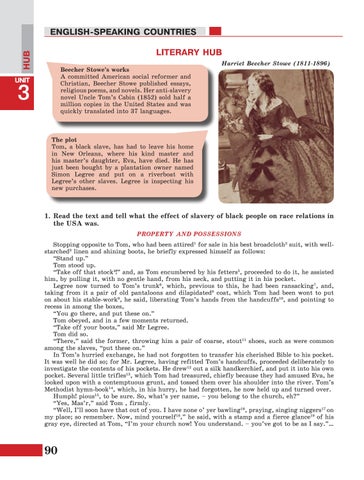HUB Lesson 1
ENGLISH-SPEAKING COUNTRIES LITERARY HUB Beecher Stowe’s works A committed American social reformer and Christian, Beecher Stowe published essays, religious poems, and novels. Her anti-slavery novel Uncle Tom’s Cabin (1852) sold half a million copies in the United States and was quickly translated into 37 languages.
UNIT
3
Harriet Beecher Stowe (1811-1896)
The plot Tom, a black slave, has had to leave his home in New Orleans, where his kind master and his master’s daughter, Eva, have died. He has just been bought by a plantation owner named Simon Legree and put on a riverboat with Legree’s other slaves. Legree is inspecting his new purchases.
1. Read the text and tell what the effect of slavery of black people on race relations in the USA was. PROPERTY AND POSSESSIONS Stopping opposite to Tom, who had been attired1 for sale in his best broadcloth2 suit, with wellstarched3 linen and shining boots, he briefly expressed himself as follows: “Stand up.” Tom stood up. “Take off that stock4!” and, as Tom encumbered by his fetters5, proceeded to do it, he assisted him, by pulling it, with no gentle hand, from his neck, and putting it in his pocket. Legree now turned to Tom’s trunk6, which, previous to this, he had been ransacking7, and, taking from it a pair of old pantaloons and dilapidated8 coat, which Tom had been wont to put on about his stable-work9, he said, liberating Tom’s hands from the handcuffs10, and pointing to recess in among the boxes, “You go there, and put these on.” Tom obeyed, and in a few moments returned. “Take off your boots,” said Mr Legree. Tom did so. “There,” said the former, throwing him a pair of coarse, stout11 shoes, such as were common among the slaves, “put these on.” In Tom’s hurried exchange, he had not forgotten to transfer his cherished Bible to his pocket. It was well he did so; for Mr. Legree, having refitted Tom’s handcuffs, proceeded deliberately to investigate the contents of his pockets. He drew12 out a silk handkerchief, and put it into his own pocket. Several little trifles13, which Tom had treasured, chiefly because they had amused Eva, he looked upon with a contemptuous grunt, and tossed them over his shoulder into the river. Tom’s Methodist hymn-book14, which, in his hurry, he had forgotten, he now held up and turned over. Humph! pious15, to be sure. So, what’s yer name, – you belong to the church, eh?” “Yes, Mas’r,” said Tom , firmly. “Well, I’ll soon have that out of you. I have none o’ yer bawling16, praying, singing niggers17 on my place; so remember. Now, mind yourself18,” he said, with a stamp and a fierce glance19 of his gray eye, directed at Tom, “I’m your church now! You understand. – you’ve got to be as I say.”…
90






















